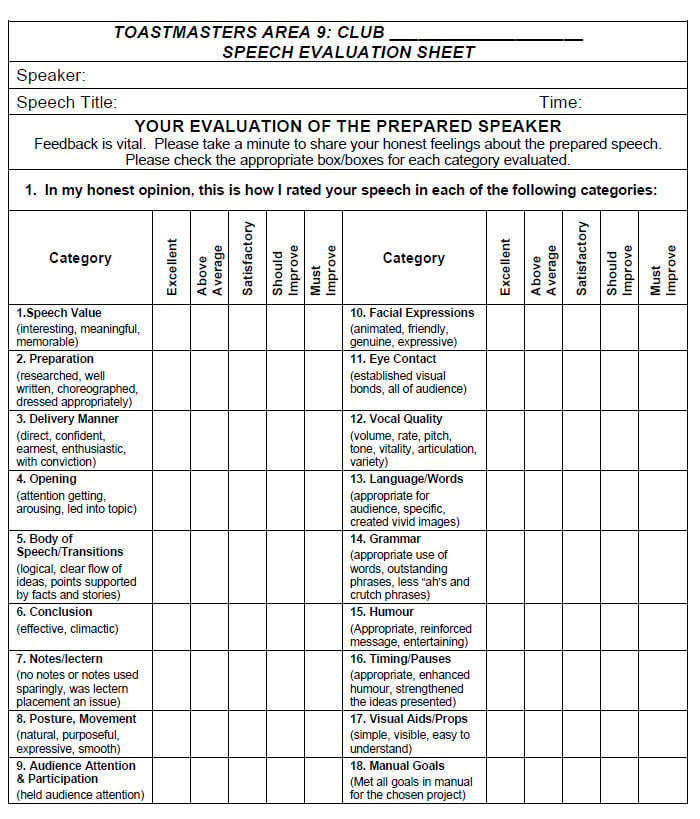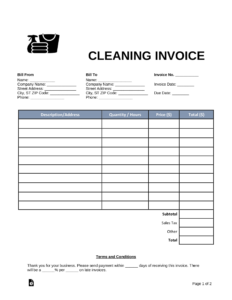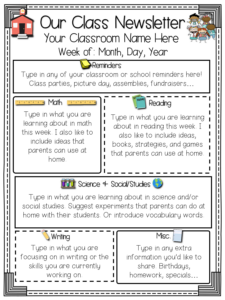Providing constructive feedback is an essential skill in any professional setting. Whether you are a manager, a teacher, or a mentor, the ability to evaluate and provide feedback can greatly impact the growth and development of individuals. Toastmaster International, a renowned organization dedicated to improving communication and leadership skills, has developed a comprehensive evaluation form that serves as a valuable tool for assessing speeches and presentations. In this article, we will delve into the details of the Toastmaster Evaluation Form, explore its components, and discuss how it can be used effectively to enhance public speaking skills. So, let’s dive in!
1. Introduction to Toastmaster International
Before we delve into the evaluation form, let’s first understand the organization behind it. Toastmaster International is a non-profit educational organization that was founded in 1924. Its primary objective is to help individuals develop their communication, public speaking, and leadership skills through a supportive and structured environment.
With over 16,800 clubs in 143 countries, Toastmasters International has become a global phenomenon. The organization offers a range of programs and resources, including regular meetings, educational materials, and speech contests, to facilitate personal and professional growth.
2. Importance of Feedback in Public Speaking
Feedback plays a crucial role in public speaking as it helps speakers identify strengths, weaknesses, and areas for improvement. Constructive feedback enables individuals to refine their delivery, enhance their message clarity, and develop their overall communication skills. Without feedback, stagnation can occur, hindering personal and professional growth.
The Toastmaster Evaluation Form serves as a structured framework for evaluating speeches and presentations. It provides a systematic approach to assessing various aspects of a speech, such as content, delivery, and body language. By following this form, evaluators can offer valuable insights and recommendations to help speakers refine their skills.
3. Understanding the Toastmaster Evaluation Form
The Toastmaster Evaluation Form is a comprehensive document that consists of several sections, each focusing on specific aspects of a speech. Let’s explore each section in detail:
3.1 Speaker Information
The form begins with a section to capture essential details about the speaker, such as their name, date of the speech, and the manual or project number they are working on. This information helps in maintaining a record of speeches and tracking progress over time.
3.2 Speech Title and Objectives
In this section, the evaluator records the title of the speech and the objectives outlined by the speaker. This step ensures that the evaluation aligns with the speaker’s intentions and goals for the speech.
3.3 Evaluation Criteria
The evaluation criteria section is the core of the form, where the evaluator rates the speaker’s performance in various categories. The Toastmaster Evaluation Form typically includes criteria such as:
- Content (message, organization, and originality)
- Delivery (voice, gestures, and eye contact)
- Language (vocabulary, grammar, and articulation)
- Physical (appearance, posture, and body language)
- Effectiveness (impact on the audience and overall impression)
By assessing these criteria, the evaluation form provides a holistic view of the speaker’s strengths and areas for improvement.
3.4 Comments and Recommendations
In this section, the evaluator provides specific comments, suggestions, and recommendations to help the speaker enhance their skills. It is essential to provide constructive feedback that focuses on both positive aspects and areas that require improvement.
3.5 Signature and Date
The evaluation form concludes with the evaluator’s signature and the date, ensuring accountability and authenticity of the evaluation.
4. Utilizing the Toastmaster Evaluation Form Effectively
While the Toastmaster Evaluation Form provides a structured framework, it is crucial for evaluators to approach the evaluation process with care and empathy. Here are some tips for utilizing the form effectively:
4.1 Active Listening
As an evaluator, active listening is key to understanding the speaker’s message, delivery, and overall impact. Pay close attention to the content, tone, and body language to provide accurate and insightful feedback.
4.2 Balance between Positive and Constructive Feedback
While it is crucial to highlight areas for improvement, it is equally important to acknowledge the speaker’s strengths. Strive for a balanced approach that motivates and encourages the speaker while providing actionable recommendations for growth.
4.3 Specificity in Feedback
Avoid vague or general feedback. Instead, be specific in your comments and recommendations. Provide examples and instances where the speaker excelled or could have improved to enhance the effectiveness of your evaluation.
4.4 Focus on Growth and Improvement
Ensure that your evaluation is centered around the speaker’s growth and improvement rather than personal judgments. Emphasize the potential for development in specific areas and provide resources or suggestions to help them overcome challenges.
4.5 Timely Delivery of Evaluation
Deliver your evaluation promptly after the speech to ensure its effectiveness. This allows the speaker to reflect on the feedback while the experience is still fresh in their mind.
5. Real-Life Examples of Effective Evaluations
Let’s explore a couple of real-life examples that demonstrate the effectiveness of the Toastmaster Evaluation Form in providing valuable feedback:
5.1 Example 1: Evaluating Content and Organization
During a Toastmasters meeting, Sarah delivers a speech on the importance of time management. As an evaluator, John uses the evaluation form to assess Sarah’s speech. He rates her content and organization highly, as she effectively engages the audience with relevant examples and a logical flow of ideas. John provides specific feedback on how Sarah’s speech could have been further enhanced with a stronger introduction and a more impactful conclusion.
5.2 Example 2: Evaluating Delivery and Body Language
Mark, a Toastmaster member, presents a speech about his recent travel experience. Emily, his evaluator, pays close attention to Mark’s delivery and body language. She notes his confident posture, appropriate gestures, and excellent eye contact. However, she suggests that Mark could improve his vocal variety to add more emphasis to key points and create a greater impact on the audience.
6. Benefits of Using the Toastmaster Evaluation Form
The Toastmaster Evaluation Form offers several benefits for both speakers and evaluators. Let’s explore some of these advantages:
- Structured Approach: The form provides a structured approach to evaluation, ensuring that all relevant aspects of a speech are considered.
- Objective Feedback: By using the evaluation criteria, the form helps evaluators provide objective feedback rather than relying solely on personal opinions.
- Personal Development: The form facilitates personal development by highlighting areas for improvement and providing specific recommendations for growth.
- Record Keeping: The form allows for maintaining a record of speeches and evaluations, enabling individuals to track progress over time.
- Enhanced Communication Skills: Through regular evaluations using the form, speakers can refine their communication skills and become more effective presenters.
7. Conclusion
The Toastmaster Evaluation Form is a valuable tool for providing constructive feedback and facilitating personal and professional growth. By following its structured approach, evaluators can offer valuable insights and recommendations to help speakers refine their public speaking skills. Remember to approach the evaluation process with empathy, balance, and specificity to ensure the feedback is actionable and impactful. Utilize the form effectively, and both speakers and evaluators will reap the benefits of enhanced communication skills and personal development.
FAQs After The Conclusion:
Q1: Can anyone use the Toastmaster Evaluation Form?
A1: Yes, the Toastmaster Evaluation Form can be used by anyone who wishes to provide constructive feedback on speeches or presentations. It is not exclusive to Toastmasters members.
Q2: Are there any resources available for learning how to use the form effectively?
A2: Toastmasters International provides various educational resources, including manuals, workshops, and mentorship programs, to help individuals learn how to use the evaluation form effectively.
Q3: How can someone become a member of Toastmasters International?
A3: To become a member of Toastmasters International, you can visit their official website and search for a local club in your area. Most clubs welcome guests, allowing them to experience a meeting before deciding to join.
Q4: Can the Toastmaster Evaluation Form be customized?
A4: While the Toastmaster Evaluation Form provides a comprehensive framework, it can be customized to suit specific needs. However, it is recommended to retain the core evaluation criteria to ensure consistency and effectiveness.
Q5: Are there any alternatives to the Toastmaster Evaluation Form?
A5: While the Toastmaster Evaluation Form is widely used and recognized, there are alternative evaluation forms available. However, it is essential to ensure that any alternative form coversthe key aspects of a speech and provides a structured framework for evaluation.
8. Summary
The Toastmaster Evaluation Form is a powerful tool for providing constructive feedback and facilitating personal and professional growth in public speaking. By following its structured approach and utilizing the evaluation criteria, evaluators can offer valuable insights and recommendations to help speakers refine their skills. The form’s emphasis on content, delivery, language, physical presence, and effectiveness ensures a holistic evaluation that addresses all aspects of a speech. By actively listening, balancing positive and constructive feedback, and providing specific recommendations, evaluators can help speakers enhance their communication skills and become more effective presenters.
Utilizing the Toastmaster Evaluation Form effectively requires empathy, clarity, and a focus on growth and improvement. By delivering evaluations promptly and utilizing the form’s sections to provide specific comments and recommendations, speakers can gain valuable insights to enhance their speeches. Moreover, the form’s structured approach and record-keeping capabilities enable individuals to track their progress over time and identify areas for continuous development.
Whether you are a member of Toastmasters International or someone seeking to improve your public speaking skills, the Toastmaster Evaluation Form can be a valuable asset in your journey. By engaging in the evaluation process and utilizing the form effectively, you can refine your communication skills, engage your audience, and make a lasting impact with your speeches and presentations.
FAQs After The Conclusion:
Q1: Can anyone use the Toastmaster Evaluation Form?
A1: Yes, the Toastmaster Evaluation Form can be used by anyone who wishes to provide constructive feedback on speeches or presentations. It is not exclusive to Toastmasters members.
Q2: Are there any resources available for learning how to use the form effectively?
A2: Toastmasters International provides various educational resources, including manuals, workshops, and mentorship programs, to help individuals learn how to use the evaluation form effectively.
Q3: How can someone become a member of Toastmasters International?
A3: To become a member of Toastmasters International, you can visit their official website and search for a local club in your area. Most clubs welcome guests, allowing them to experience a meeting before deciding to join.
Q4: Can the Toastmaster Evaluation Form be customized?
A4: While the Toastmaster Evaluation Form provides a comprehensive framework, it can be customized to suit specific needs. However, it is recommended to retain the core evaluation criteria to ensure consistency and effectiveness.
Q5: Are there any alternatives to the Toastmaster Evaluation Form?
A5: While the Toastmaster Evaluation Form is widely used and recognized, there are alternative evaluation forms available. However, it is essential to ensure that any alternative form covers the key aspects of a speech and provides a structured framework for evaluation.
In conclusion, the Toastmaster Evaluation Form is a valuable tool for evaluating speeches and presentations. It provides a structured approach, objective feedback, and specific recommendations for improvement. By utilizing this form effectively, speakers can refine their communication skills and enhance their overall effectiveness as presenters. Whether you are a member of Toastmasters International or someone seeking to improve your public speaking abilities, the Toastmaster Evaluation Form can be a valuable asset in your journey towards becoming a confident and impactful speaker. Embrace the evaluation process, deliver feedback with empathy and clarity, and watch as your speaking skills soar to new heights.





